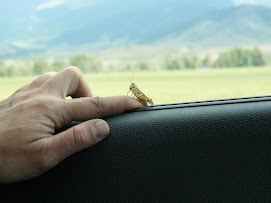I've been working really hard at not referring to my parents' house as home, because it's not really my home anymore. When people in Baltimore ask what I'm doing for Christmas, I force myself to say "I'm going to my parents' house", because that's what it is. I don't live there anymore, I don't even usually sleep in the room that used to be mine anymore. I still have a lot of crap there, but it's really more of a holding ground before I get around to selling it (the stuff, not the house. I don't think my parents would appreciate me selling their house).
To be fair, though, it isn't really like Baltimore is home, either. As much as I love RHHP (the Reservoir Hill House of Peace, the awesome community where I live), it isn't exactly home. RHHP is very much a transitional community, in that it is a community that is constantly in transition, made up of people constantly transitioning. There are currently 5 volunteers living there (4 in Mennonite Voluntary Service, including me, and one in the Brethren Voluntary Service), 1 asylum seeker and 4 asylees (basically refugees who didn't go through a second country before coming to the U.S.) and 4 renters (people who live in the house and participate in the community, but aren't asylum seekers or refugees or volunteers). We all share meals and cups of tea and have conversations and teach each other to cook our favorite foods, but everyone knows no one is really ever there forever. Most of the volunteers are there for one year. The asylum seekers are there because, for them, it is free housing while they apply for asylum, and then cheap housing while they wait for their families to come to the U.S. The renters tend to be more long-term, but I don't think anyone really imagines themselves there forever.
For the asylum seekers especially, RHHP is not home. We have 3 people from Cameroon, one from Ethiopia, and one from Iraq. Last night as I was making cheesecake for work, the asylee from Iraq, was making his dinner. One of the asylees from Cameroon, came in and asked how we were and what we were doing. "I'm cutting onions," he said. "That's why I left my home. I come here and I cut onions. In Iraq I had 10 bodyguards and 2 cooks. Here, I cut onions." He said it to be funny, and we all laughed, but there was also a certain bitterness and sorrow to it. The asylee from Iraq is a doctor, in Iraq he was in charge of over 100 hospitals. Here he works off an on as a translator while he struggles to pass exams to become a resident in a hospital so he can practice medicine again. He has been in the U.S. for 2 years, and has been waiting for his family to come since July. He has 5 children, including a 2 and a half year old daughter. He is Muslim, so I don't think Christmas without his family will be especially hard. But I know it has been incredibly hard for him celebrating Eid, Ramadan, and other holidays alone. He is the only Muslim in a house of Christians. We talk about traditions and share meals and stories with each other, but the fact remains that he is here and his family is there and he has no idea when or if he'll see them again.
Christmas comes with a certain bitterness at work, too. We extended out clients' curfews for Christmas so that they could spend time with their families. This has been met with mixed emotions- of course people are glad for the extra time, but it is also a reminder that they are in their 40s or 50s and are subject to curfews, to room checks, to chore inspections. And of course, not every client has family in the area, and not every client with family in the area has a good relationship with them.
Who wrote that home is where they have to take you in when you show up? Was that Frost? We read it in my American lit from 1900- 1950 class, but I broke my back that semester and don't remember a lot of specifics. I do remember that line, though. It was about a couple living on a farm, and a man who used to work for them shows up, and they can't turn him away. I think the husband says to the wife something like "Why doesn't he go home?" and the wife says something like "Home is where they can't turn you away. This is home to him." And I guess for many of the people in my life, that's what the shelter or RHHP are right now. It's not home, exactly, but it's what you've got right now. It's where your stuff is, it's where you eat and sleep and wash your clothes. But isn't home more than that? I hope one day it is.
2013 RHHP Thanksgiving dinner
12 years ago


No comments:
Post a Comment